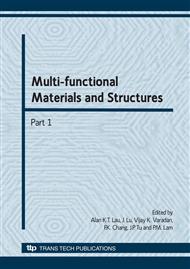p.1
p.5
p.9
p.13
p.17
p.21
p.25
p.29
Parametric Study of Machining Effect on Residual Stress and Surface Roughness of Nickel Base Super Alloy UDIMET 720
Abstract:
Machining parameters such as speed (v), feed (f) and depth of cut (d) play an important role in determining the residual stress as well as the surface roughness of a material. The material used for the present study is a nickel based super alloy Udiment 720 which finds applications in the manufacture of gas turbine engine components. Residual stress and surface roughness measured on this material showed different magnitudes for different combinations of milling parameters but did not reveal any definite trend. Analytical relationships developed between the magnitudes of residual stress, surface roughness and milling parameters indicated that combined effects of the milling parameters influence both residual stress and surface roughness.
Info:
Periodical:
Pages:
13-16
Citation:
Online since:
June 2008
Authors:
Keywords:
Price:
Сopyright:
© 2008 Trans Tech Publications Ltd. All Rights Reserved
Share:
Citation:


